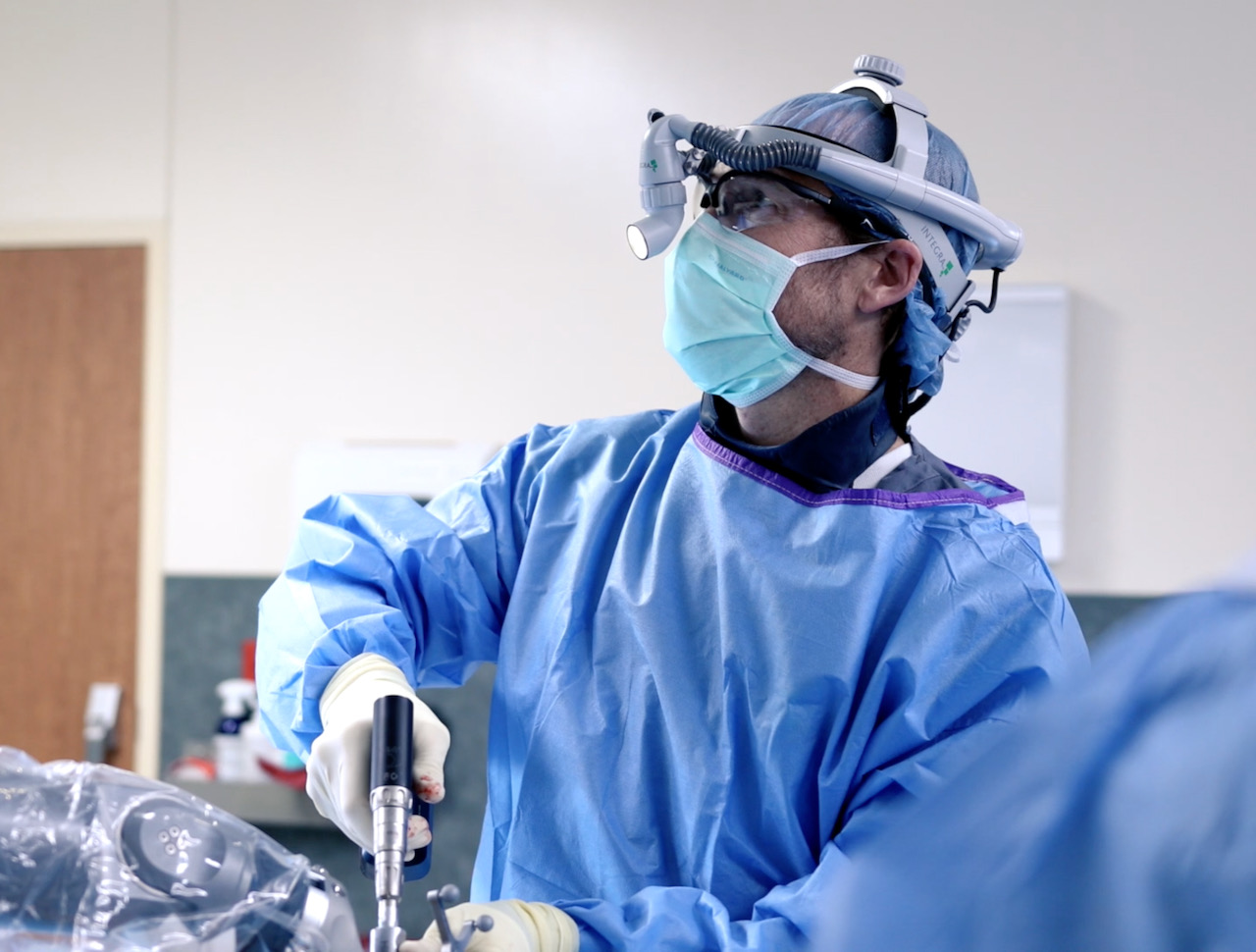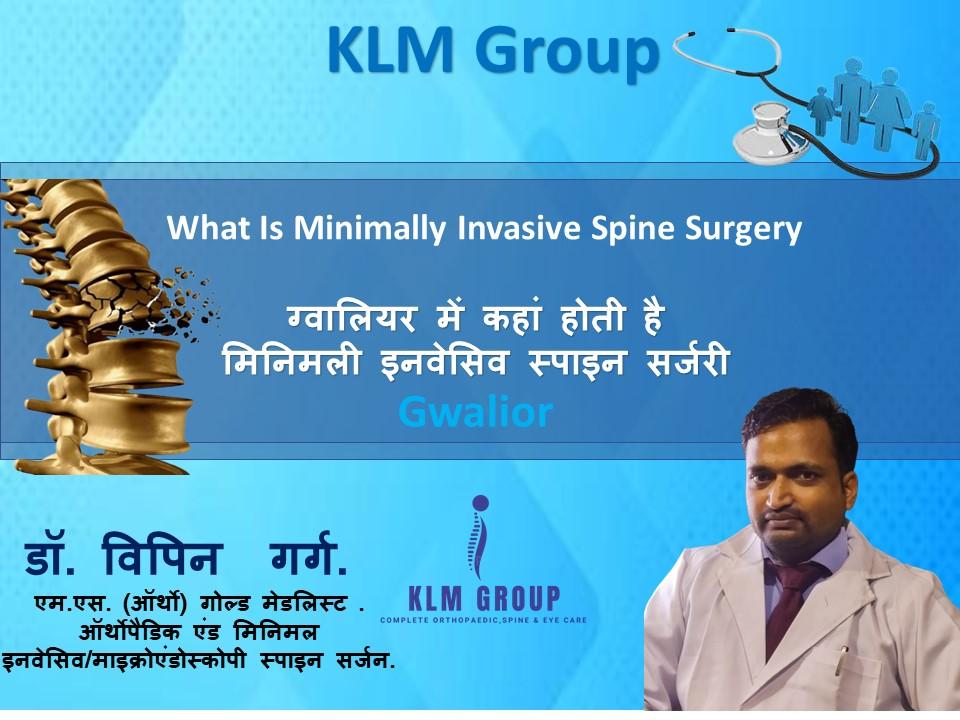MISS (minimally invasive spine surgery) is a form of spine surgery that involves just minor incisions (backbone). Smaller incisions are used in this sort of surgery than in traditional surgery. This usually results in less damage to adjacent muscles and tissues. It may result in reduced discomfort and a quicker recovery time following surgery.
- Why might I need minimally invasive spine surgery?
- What are the risks of minimally invasive spine surgery?
- How do I prepare for minimally invasive spine surgery?
- What happens during minimally invasive spine surgery?
- What happens after minimally invasive spine surgery?
- Next steps
- Minimally Invasive Spine Surgery At Gwalior
Open surgery is the most common type of spine surgery. A large incision is made down the back for this procedure. It would be necessary to move the muscles and soft tissue around the spine. Tissue may need to be removed in some circumstances.

The healthcare professional creates a smaller incision during MISS. After that, he or she will implant a tubular retractor. This is a tube-shaped, rigid instrument. It forms a tunnel to the spine’s problematic location. It softly pulls the muscle and soft tissue in the surrounding region aside. The surgeon can then use tiny instruments to work on the spine via the tunnel. A special operating microscope is also used by the surgeon, who may see real-time X-ray pictures of the spine.
MISS can be used by surgeons for some types of spine surgery. Lumbar discectomy, laminectomy, and spinal fusion are some of the procedures available.

Why might I need minimally invasive spine surgery?
The majority of patients with back discomfort do not require surgery. If you have a back condition that hasn’t improved with conventional treatments, such as medicine or physical therapy, your healthcare physician may recommend spine surgery. If you’re still in a lot of discomfort, spine surgery can be the answer. However, spine surgery isn’t a panacea for all back ailments. Your doctor will only recommend spine surgery if you have an issue that surgery can assist with. This can include things like:
- Disc herniation
- Spinal stenosis is a condition that affects the spine (narrowing of the spinal canal)
- Deformities of the spine (like scoliosis)
- Stability of the spine
- Spondylolysis is a condition that affects the spine (a defect in a part of lower vertebrae)
- Vertebral fracture
- A tumour in the spine was removed.
- Infection in the back

If you’re considering spine surgery, see your doctor to see if MISS is a viable option. MISS is not suitable for all types of spine surgery. Not all hospitals or other surgical facilities are MISS-ready.
Read More:
What are the risks of minimally invasive spine surgery?

Every procedure comes with its own set of dangers. The following are some of the hazards of minimally invasive spine surgery:
- Infection
- Bleeding that is excessive
- The graft site is in pain.
- Damage to the nerves
- Clots in the blood
- Anesthesia-related complications
- Spinal fluid leakage. This might result in headaches or other issues.
- Your back ache isn’t getting any better.
Your risks may differ depending on your age, general health, and the sort of operation you’ve had. Having the surgery done at a clinic that is familiar with the procedure will assist reduce your risks. Discuss the dangers that are most relevant to you with your child’s healthcare professional.
How do I prepare for minimally invasive spine surgery?
Consult your doctor for advice on how to prepare for your operation. Tell your doctor about all of the medications you’re taking. Aspirin and other over-the-counter medications fall into this category. Some medications, such as blood thinners, may need to be stopped ahead of time. You’ll need to quit smoking before your operation if you’re a smoker. Smoking has been shown to slow the healing process. If you need assistance quitting smoking, go to your doctor.

Imaging examinations may be required prior to surgery. X-rays and magnetic resonance imaging are two examples (MRI).
The night before your procedure, do not eat or drink after midnight. Any recent changes in your health, such as a fever, should be reported to your healthcare professional.
What happens during minimally invasive spine surgery?
An orthopaedic surgeon and a qualified medical team do MISS. MISS details differ depending on where area of the spine is being treated, as well as other circumstances. Your doctor can assist you understand what to expect from your operation. Here’s an example of how MISS is carried out:
- A sort of anaesthesia that numbs a section of your body may be used on you. You’ll be sedated as well. This will help you relax while yet keeping you aware throughout operation. You might also be put under general anaesthesia. This minimises pain and allows you to sleep through the procedure.
- During the procedure, a healthcare expert will keep a close eye on your vital indicators, such as your heart rate and blood pressure.
- Antibiotics may be administered to you before and after the procedure. This is to aid in the prevention of infection.
- Your surgeon will view the operation using a unique form of X-ray during the process.
- In the region that has to be treated, the healthcare expert will make a tiny incision on your back. This incision is closed with a tubular retractor. This will reveal the area of the spine that has to be addressed.
- After that, the surgeon will insert little instruments into the retractor. A small camera and a light are included.
- The necessary spine repairs will subsequently be performed by your healthcare specialist.
- The tools and retractor are then removed once the repairs are completed. Stitches, glue, or staples are used to seal the wound or incisions. The wound is covered with a tiny bandage.
What happens after minimally invasive spine surgery?
MISS can be performed as an outpatient operation in some cases. This implies you’ll be able to return home the same day. After the surgery, you will be required to stay for a few hours so that your healthcare professional can monitor for complications. Alternatively, you may be required to spend one or more nights in the hospital. When you’re ready to return home, you’ll need someone to drive you there.
After the procedure, you will experience some discomfort. Pain medications can help with this. Inquire with your doctor whether there are any over-the-counter pain relievers you should avoid. The discomfort will usually subside immediately.
As soon as you are able, you can return to your regular diet.
Your incision may leak a little quantity of fluid. This is very normal. If the quantity of liquids you drink increases, or if you develop a fever or worsening discomfort, contact your healthcare professional straight away. If you have severe symptoms, such as problems breathing or a strong headache, contact your healthcare professional very away.
After surgery, your healthcare practitioner will provide you advice on how to utilise your back. Lifting and bending may be restricted. After the treatment, you may need to wear a back brace for a while. After the procedure, you may require physical treatment. This will help you heal by strengthening the muscles around your spine. The length of your recuperation will be determined by the sort of surgery you have and your overall health. In a few weeks, you may be able to resume normal activities.
Make sure you follow your healthcare provider’s treatment and follow-up visit recommendations to the letter. This will ensure that the procedure is successful for you.
Next steps
- Before you consent to the test or process, make sure you are aware of the following:
- The test’s or procedure’s name
- Why are you having the test or operation done?
- What to anticipate from the findings and what they imply
- The test or procedure’s risks and advantages
- What are the potential problems or adverse effects?
- When and where will the test or operation be performed?
- Who will conduct the exam or process, and what are their credentials?
- What if you didn’t have access to the test or procedure?
- Any other tests or processes to consider when it comes to getting the results? When and how will you obtain the results?
- If you have any questions or difficulties following the test or operation, who should you contact?
- What will the cost of the test or operation be?
Minimally Invasive Spine Surgery At Gwalior
The managing director of the KLM Group is Dr. Vipin. He is a well-known Orthopedic Surgeon who has won several gold medals. Be guaranteed of superior healthcare and world-class medical services in Orthopaedic, Spine care in gwalior, Ophthalmology, X-ray & Diagnostics services, as well as physiotherapy services in Gwalior, strongly recognised for his trustworthy and focused attitude.
Book Your Consultation
Website: https://tinyurl.com/yyzvwmck
Email: info@klmgrou p.org
Ph: 0751-4000721,Mob: 7804826825
Address: 12, Saraswati Nagar, University Road, Near Silver Estate, Thatipur,

